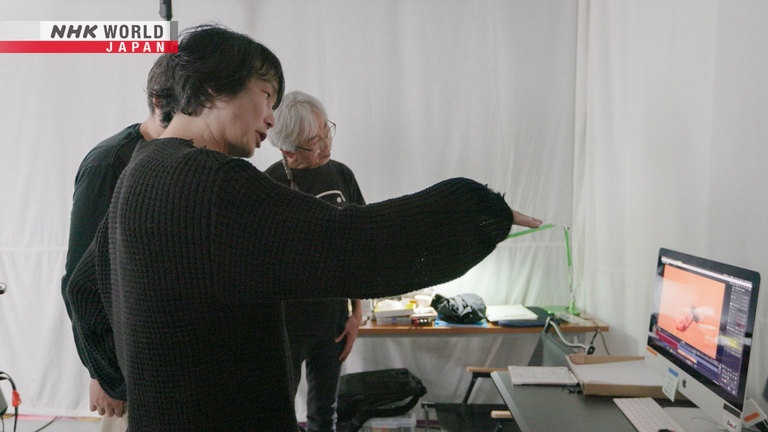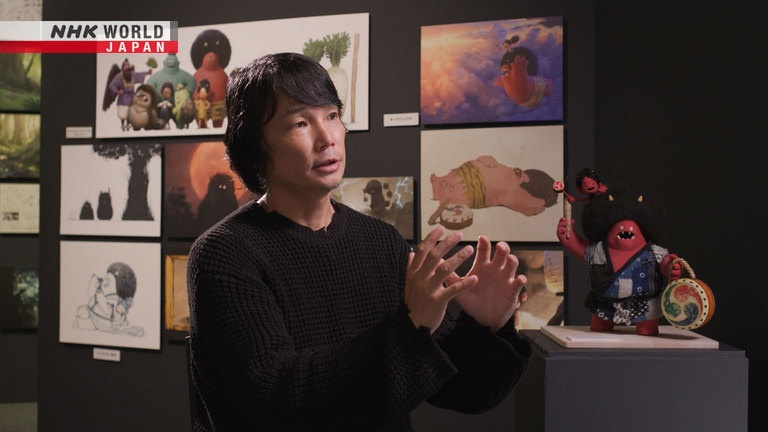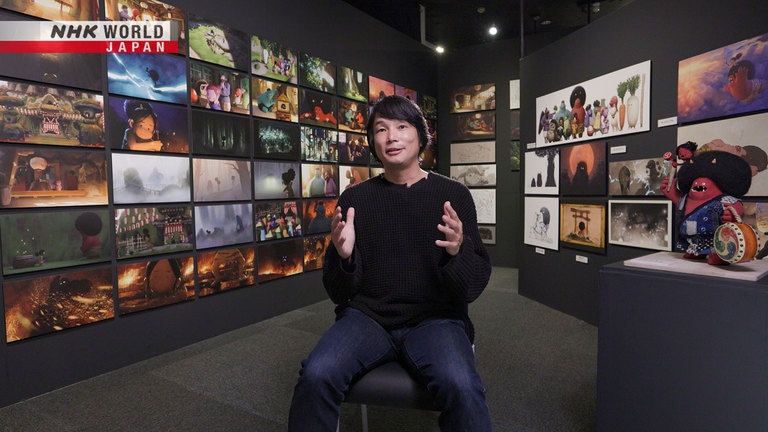The Feeling of Fearing the Unknown: Daisuke "Dice" Tsutsumi / Animation Film Director
In 2023, "ONI: Thunder God's Tale," Japan-born animation film director Daisuke "Dice" Tsutsumi's first film, won the prestigious Annie Award. He explains its "fear of aliens" theme and his own roots.



Transcript
Direct Talk
In February 2023,
the first animated feature film directed by
the Japan-born animation film director
Daisuke "Dice" Tsutsumi,
won two Annie Awards
the highest honor in the world of animation,
including Best Picture.
ONI: Thunder God's Tale
"ONI: Thunder God's Tale"
is set in a world where the supernatural
entities and spirits called yokai
and gods from ancient
Japanese folklore are active.
The story depicts a peaceful village
that is terrorized and driven into panic
by the imminent attack of "ONI,"
a terrifying demon.
Tsutsumi expressed in this work
the sense of solitude he's felt
since moving to the U.S. 30 years ago.
When I started making the story of Oni,
I wanted to make sure that
this feeling of outsider is universal.
What are Tsutsumi's thoughts
on the film he created
based on his own roots and Japanese folklore?
He will tell us.
The Feeling of Fearing the Unknown
The setting of "ONI" is a village
deep in the mountains of Japan.
The humorous villagers
appearing in the film are yokai
such as kappa water creatures
and tengu long-nosed goblins,
and gods whose stories have been handed down
in Japan since ancient times.
We are now only months away
from the coming of the demon moon.
In order to protect their village against
the imminent once-in-a-century demon attack,
the villagers strive to enhance
their own special powers.
The father of the main character "Onari"
is the thunder god, who can cause lightning.
However, Onari never shows
any sign of displaying the power
she should've been inherited from her father.
The film describes Onari's struggles
in the face of the demon attack
based on the worldview of Japanese folklore.
This was my first time
directing a big project like this,
I was definitely nervous.
I was born and raised in Japan
and I am a native Japanese.
I had to make sure this film feels authentic
with Japanese culture, Japanese landscape,
and the Japanese feel.
That was something I really cared
when we were making Oni.
Before I moved to America,
I didn't necessarily
appreciate my own culture.
But after many years
of living in the United States
and seeing my beautiful country from outside,
I became more and more proud to be Japanese.
And really kind of made me think
about my identity.
But my identity is not
just Japanese,
I really consider myself
as a Japanese person
who lives in the United States,
and that is my identity.
That is unique about me,
and if I can utilize my identity to
bring these two cultures together,
I think that would be
exciting.
As the day of the demon attack approaches,
fear grows among the villagers of the demon
who, in fact, they have never seen.
One day, while the village is in turmoil,
Onari goes to the forest where demons are
said to live and the villagers never go near.
Suddenly, a large city where humans live
spreads out before her.
In the city, Onari meets
a foreign boy named Calvin.
They reach out to each other
and Calvin shares with Onari
his feelings as an "alien" in Japan.
You know,
I'm Gaijin.
Gaijin?
It means "outside people" in Japanese.
They just fear people they didn't understand.
The day of the attack eventually arrives.
Even though the demon
hasn't even shown up yet,
the villagers are taken over by fear,
and the village is thrown into chaos.
I was always fascinated by
the origin of Oni.
One of the theories that I always loved
is that Oni
came from the region oftentimes where
a lot of foreigners lived in ancient times.
And people are scared
because they look different,
people didn't understand them
because they are different,
and they said, "That's Oni."
They thought they are monsters, they are bad.
When I thought about the concept of Oni
being an outsider or people being scared
of people who don't understand,
I felt that's so timely today.
After hundreds of years,
we are still doing the same thing,
we are scared of people
who we don't understand,
we are scared of cultures
we don't like or we don't understand
or people who look different from us,
we fear them,
and that's the theme of this story.
When I first
went to the States, and I went to
a small college in Upstate New York at first,
and I went to a restaurant
and everybody looked at me
as if there was like this strange alien
walked into the restaurant.
I never had experienced it before
because I grew up in Japan.
In Japan, everybody looked like me,
and over there,
they thought I was
like an alien.
So, it's the human nature.
It's not even about racism.
It's not even about
a certain group of people
have a tendency to stereotype.
It's a human nature that we all possess.
Valuable materials and items related to
the production of "ONI: Thunder God's Tale"
were put on display at
an exhibition in Japan.
It showed the process by which
the distinctive characters
and traditional Japanese settings
were created.
Tsutsumi says that the unique
worldview of Japanese folktales
was the key to the creation of this film.
One fascinating thing
about Japanese folklore is
very different from western storytelling
is that there is not much like
good and evil distinction.
For example, the devil Oni sometimes
is not always bad in Japanese folklore.
Sometimes Oni is a god
who protects certain group of people,
but oftentimes Oni is the villain and
the kind of flip-flop between
good and evil, light and darkness.
That's what I love about Japanese folklore
because there is much more
ambiguous quality to how
they interact.
Depending on whose perspective,
the evil could become
good,
and in a way that is
timely to the world we live in,
depending on who you choose
to focus on, good can be evil.
Born in Tokyo in 1974,
Tsutsumi moved to the U.S.
by himself at the age of 18
and studied oil painting
at an art college in New York.
After graduation, he jumped straight
into the world of animation.
And then in 2007 he joined Pixar, where he
worked as art director on numerous hit films.
Tsutsumi had been steadily
building up his career.
However, in 2014, he decided to
set up his own animation studio.
One point I started to question,
why I was making a film,
why I was working for animation company,
and I couldn't answer why.
I couldn't ask this amazing, beautiful,
comfortable, exciting nest like Pixar
to provide the answer that I am looking for.
That's my answer I am looking for.
They are not responsible for my answer.
I think part of me felt like
I needed to go without any assurance,
because if I think about assurance,
then I start to play safe,
and if I play safe,
I am going to go back to
the same comfortable sort of root,
and I start to forget
the reason why I am doing this.
I talked to one of my best friends
at Pixar, Robert Kondo,
and he and I said,
"Maybe we make our own film
and see if that guides us to find
the reason why
we are doing what we are doing."
We felt like,
"Okay, it's going to be hard,
but that's probably the only way
that we can find our answer."
After launching his studio,
Tsutsumi produced "ONI,"
his first feature-length animated film.
In October 2022, the film was released.
Instead of a theatrical release,
it was distributed via streaming platforms
in 190 countries and regions around the world.
Tsutsumi says that the power
of internet-based distribution
has enabled animation to transcend national
and cultural boundaries more than ever before.
What streaming platforms
changed this industry is
they have a much wider reach.
That allows us to be a lot more focused
in terms of the type of story,
in terms of type of setup.
It didn't have to be big and broad
sort of Hollywood film to be able to create.
It was the week
of the first Oni was released
I got a lot of messages.
One of them was
this artist in Ukraine,
and he sent me a video of his daughter
singing and dancing Onari's dance.
I was just touched that our story
could reach that far away,
even people in a country that is in a war.
And the fact that a kid from Ukraine,
who doesn't speak Japanese,
is singing in Japanese.
That's as good as it can get.
It touched me so much.
She saw herself in the story,
and that's the power of animation.
What's really fascinating about animation
is that hopefully we create characters that
people can relate to,
people can empathize with.
It's a much better way
to communicate your point than
telling them what to do or giving them
a lesson or lecturing, right?
Nobody wants to be lectured.
If you are watching your friends,
let's say your character is your friend,
if you are watching someone you care about,
you will think about
how we can solve this problem, how
is this character going to overcome this,
and that is the possibility
of animated story.
Tsutsumi is now working on a
short animation film to be released in 2024.
For this new work, he's taken on the
challenge of using "stop motion animation"
instead of computer graphics.
He believes that today
it's meaningful and rewarding
to create a work with figures
you can actually touch and feel.
Like you can really feel the human hands.
It's so important in the time
of post-pandemic society, I feel like.
Because you really can see it
and touch it, and
you know, kind of, get the feel of
breathing of people who are working on it.
I really believe that there is something
about this medium that is extra special.
Finally, we asked him to give us his motto.
When you are ready, it's too late.
I think we all want to
spend a lot of time preparing
for things you want to do.
But I always do it before
I spend too much time getting ready.
I am not going to lie.
I think because of my personality,
just jumping on the action before preparing,
many times I,
I failed because of it.
But I would say overall I got
more opportunities because I just did it.
I didn't ask for anybody to give me the
permission to do things, but I just did it.
And if I failed, so what?
I would do it again until I succeed.